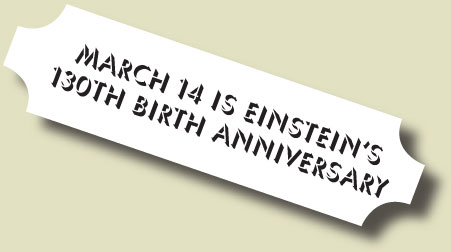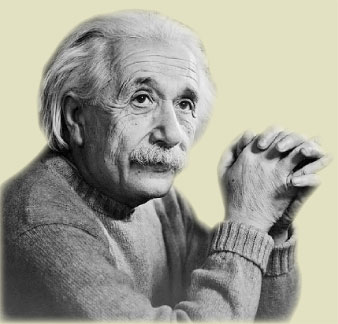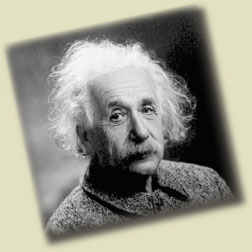 
Who was a rotten speller; shabby
dresser and a cartoonist’s dream come true with his wild hair? Yup
that’s right Einstein. He proved Newton wrong by describing his Theory
of Relativity. And surprisingly he did not only hate scrabble, but
science fiction (SF) as well! He was under the impression that SF
distorted true science. Referring to SF he had said “I never think of
the future. It comes soon enough.”
| ‘One week
before his death Einstein signed his last letter - a letter
to Bertrand Russell in which he agreed to his name being
included in a manifesto urging all nations to give up
nuclear weapons.’ |
Einstein was a German-born theoretical physicist. Often referred to
as a genius by many including his biographer Don Howard, Einstein was
born into a Jewish family in Ulm, Germany, on March 14, 1879. Although
the genius was reported to have had early speech difficulties, he was a
student from elementary school.
When Einstein was just five his father - Hermann Einstein - showed
him a pocket compass. Einstein realized that there must be something in
the space, previously thought to be empty, that was moving the needle.
He later stated that this incident had made a “deep and lasting
impression”. As Einstein grew up he started to show a special talent for
mathematics, while he built models and mechanical devices for fun.
After the failure of the family business the Einsteins moved to Pavia
leaving Albert behind in Munich to finish high school, but in the spring
of 1895, he withdrew, joining his family.
 Einstein
decided to apply directly to the Eidgenossische Polytechnische Schule in
Zurich, Switzerland, where he sat for an entrance examination, which he
failed in spite of obtaining exceptional grades in mathematics and
physics. Einstein
decided to apply directly to the Eidgenossische Polytechnische Schule in
Zurich, Switzerland, where he sat for an entrance examination, which he
failed in spite of obtaining exceptional grades in mathematics and
physics.
It was this very year - at the age of 16 - he first performed his
famous thought experiment, visualizing traveling alongside a beam of
light. Einstein graduated in 1900 from the Polytechnic in Zurich with a
diploma in mathematics and physics. He received Swiss citizenship in
1901.
After almost two years of job hunting a former classmate’s father
helped him to get a job, at the patent office in Berne.
With friends he met in Berne, Einstein formed a weekly discussion
club on science and philosophy humorously named the Olympia Academy.
Their readings influenced Einstein’s scientific and philosophical
outlook. It was also during this time that he published the renowned `Annus
Mirabilis Papers’, in `Annalen der Physik’.
At the age of 26, Einstein was awarded a PhD by the University of
Zurich. By 1909 Einstein was recognized as a leading scientific thinker,
by which time he resigned from the patent office. He was appointed a
full professor at the Karl-Ferdinand University in Prague in 1911. From
1914 to 1932 he was also a director at the Kaiser Wilhelm Institute for
Physics.
He worked in the fields of statistical mechanics and made
considerable contributions to the quantum theory, but he is most
renowned for his papers on Light and Theories of Relativity,
specifically mass-energy equivalence. He proved that space and time are
not absolute, and the relativistic universe we inhabit is not the one
Newton `discovered’.
Einstein was awarded the 1921 Nobel Prize in Physics, “for his
services to Theoretical Physics, especially for his discovery of the law
of the photoelectric effect”. On his third visit to the United States in
1932 he was offered of a post at Princeton, which he accepted.
In August 1939, Roosevelt received a letter - the renowned Einstein-Szilárd
letter - which urged US to research into harnessing nuclear fission,
which later became known as the Manhattan Project, the largest covert
research operation at the time.
 The
first operational nuclear weapons were used on Hiroshima and Nagasaki.
Although Einstein never played a role in the actual development of the
Atomic bomb he had later expressed his regret on signing the letter. The
first operational nuclear weapons were used on Hiroshima and Nagasaki.
Although Einstein never played a role in the actual development of the
Atomic bomb he had later expressed his regret on signing the letter.
In 1940 Einstein became a US citizen, but chose to keep his Swiss
citizenship. One week before his death Einstein signed his last letter -
a letter to Bertrand Russell - in which he agreed to his name being
included in a manifesto urging all nations to give up nuclear weapons.
On April 18 1955, Albert Einstein died, in Princeton Hospital, of an
aortic aneurysm, at the age of 76.
Apart from the Nobel Prize in 1921 he received numerous honors
including the Royal Society Copley Medal in 1925, Gold Medal of the
Royal Astronomical Society in 1926 and a lunar crater named Crater
Einstein.
He was a Fellow of Royal Society in 1921, LMS Honorary Member in
1924, Fellow of Royal Society of Edinburgh in 1927 and AMS Gibbs
Lecturer in 1934. Einstein published over 300 scientific and over 150
non-scientific works. He was named the `Person of the Century’ by Time
Magazine in 1999.
- Sajitha
|


